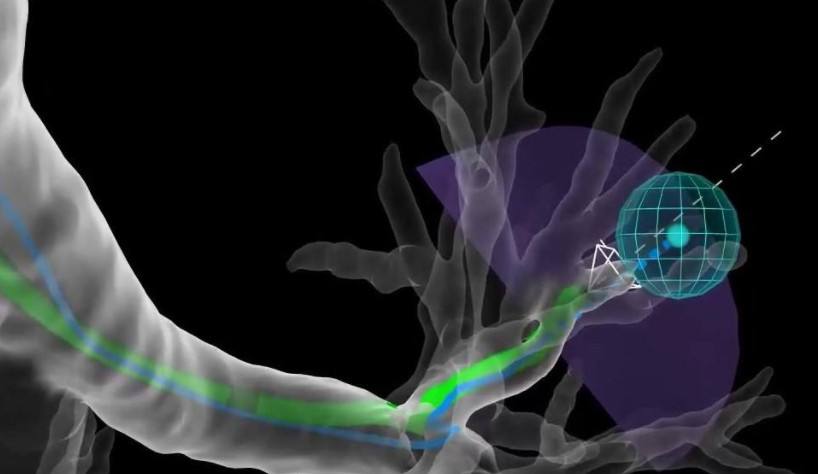-
Science Saturday: A robotic GPS for targeting, delivering regenerative biotherapies

A remote-controlled bronchoscope that acts like a GPS system hunts down hard to find lung masses and accurately biopsies them, according to a Mayo Clinic collaborative study. This multisite research, which is published in Annals of Thoracic Surgery, lays the foundation for precisely finding early stage cancer and targeting it with regenerative biotherapeutics needed to stimulate healing.
Artificial intelligence gleaned from CT scans directs the robotic fiber optic cable, providing a GPS-like pathway to tiny nodules, or masses, that manual bronchoscopes might miss. A biopsy is performed through the airway, rather than through the skin, which may make it easier for patients to tolerate. The surgeon navigates the bronchoscope with a remote guidewheel, tracking by screen its journey in real time through the lungs.

"In the past, we didn't have a reliable way of reaching these nodules in the lungs from within the airway. This is a very small catheter that gets almost anywhere, and is able to access and biopsy lung nodules," says Janani Reisenauer, M.D., first author on the study and a Mayo Clinic thoracic surgeon. "It's very similar to driving a car and having your normal street view with the aid of the GPS in your car telling you in real time where to turn right and left to arrive at your destination."
With an eye on the future, Mayo Clinic's Center for Regenerative Medicine is collaborating with Mayo Clinic's Division of Thoracic Surgery to develop biotherapeutics that may one day be delivered through such robotic bronchoscopes. The new technology offers hope of targeting restorative therapies to cancer cells while preserving surrounding healthy tissue.
Researchers at Mayo Clinic and five other academic medical centers tested this remote-control technology on 241 patients. In the widest-range study of this particular technology to date, the robotic bronchoscope accurately located and biopsied 271 lung nodules. The study found very low risk of lung collapse or bleeding.

The robotic bronchoscope accurately located and biopsied 271 lung nodules. This lays the foundation for finding early stage cancer.
"This proves that we can get to the nodules and biopsy them with reliable consistency. It now puts the puzzle pieces in play to begin the next phase," says Dr. Reisenauer. "That could mean injecting chemotherapy or immunotherapy, or some sort of viral vector, that can be deployed and sequentially released to either reduce the burden of disease or potentially cure it. This could totally transform early lung cancer treatment."
Ramping up biomanufacturing at Mayo Clinic
Mayo Clinic aspires to deliver first-of-their-kind biotherapeutics that provide new cures — treatments that could be delivered by bronchoscopes to intricate places in the lungs and other parts of the body. Mayo has made significant investments in facilities in Arizona, Florida and Rochester that comply with current Good Manufacturing Practices. These facilities are needed to meet strict quality control and regulatory standards for manufacturing new clinical therapies.
The Center for Regenerative Medicine will lead this biomanufacturing effort in close collaboration with Research, Practice and Education leaders at Mayo Clinic, and key stakeholders, including the Department of Laboratory Medicine and Pathology, the Cancer Center, Center for Individualized Medicine, Mayo Clinic Ventures, Mayo Clinic Platform, Center for Digital Health and Mayo Clinic International.

"Mayo Clinic is uniquely positioned to translate breakthrough discoveries to clinical-grade biotherapeutics to address the unmet needs of patients," says Julie Allickson, Ph.D., the Michael S. and Mary Sue Shannon Director of Mayo Clinic's Center for Regenerative Medicine and the Otto Bremer Trust Director, Biomanufacturing and Product Development, Center for Regenerative Medicine. "Mayo Clinic is poised to combine its world-class, scientifically validated research with its significant biomanufacturing facilities to create a pipeline of regenerative technologies, including new cell, gene and gene-modified cell therapies, acellular products and tissue engineering platforms that are not available anywhere else in the world."
Specifically, Mayo Clinic will focus on manufacturing seven types of biotherapeutics:
- Nonmalignant cellular therapies, such as mesenchymal stem cells, matrices and dendritic cells.
- Malignant cellular therapies, such as chimeric antigen receptor-T cell therapy.
- Gene therapy, including genetic engineering and reengineered viruses.
- Extracellular vesicles that deliver healing messages to cells.
- Tissue engineering and biomaterials.
- Synthetic microbial biology, redesigning organisms to meet medical needs.
- Phage therapy involving special viruses that attack specific bacterial infections.
Next steps for robotic bronchoscope
More research is needed to understand the full potential of robotic bronchoscope. Researchers will focus next on clinical trials that could reveal how much of a biotherapeutic a robotic catheter can safely deliver and whether therapies could be left in place to advance healing before surgery.
Depending on the outcome of the clinical trials, it could take five years to gain regulatory approval for use of robotic bronchoscopes in daily clinical care in delivering biotherapeutics for early stage lung cancer.
The sites that participated in the robotic bronchoscope study are:
- Mayo Clinic in Rochester.
- Henry Ford Hospital, Detroit.
- Pinehurst Medical Clinic, Pinehurst, North Carolina.
- First Health Moore Regional Hospital, Pinehurst, North Carolina.
- The University of Texas MD Anderson Cancer Center, Houston.
- Beth Israel Deaconess Medical Center ― Harvard Medical School, Boston.
- Massachusetts General Hospital ― Harvard Medical School, Boston.
####
Watch a video of the GPS system







